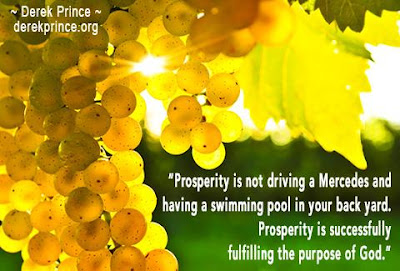Is
it God’s will to prosper all who place their faith in Him?
Among the various points advanced by proponents
of the prosperity gospel is this greeting
by the apostle John: “Beloved, I pray that in all respects you may prosper and
be in good health, just as your soul prospers” (3 John 1:2).
A commentator * has this to say about 3 John 1:2: "In every respect, I wish that it may go as well with
you as it does with your soul; that in your worldly prosperity, your comfort,
and your bodily health, you may be as prosperous as you are in your religion."
If that is so, why
did apostle Paul instruct us about the virtues of contentment—while he was languishing in prison during his last days on earth?
“I am not complaining about having too
little. I have learned to be satisfied with whatever I have. I
know what it is to be poor or to have plenty, and I have lived under all kinds
of conditions. I know what it means to be full or to be hungry, to have too
much or too little” (Philippians 4: 11-12).
What about the unsung heroes whose names—unlike the patriarchs, prophets and kings like David—were not emblazoned on the gilded
plaques hanging in the halls of fame, fortune and faith?
These were the ones who
were stoned to death or sawed in two; had nothing but sheep skins or goat skins
to wear; poor, mistreated, and tortured; wandered in deserts and on mountains
and lived in caves (Hebrews 11:37-38).
“The poor you will always have
with you …” So says Jesus according to the
accounts of three of the four Gospel writers (Matthew 26:11, Mark 14:7, and
John 12:
God does not promise that all of us will live in bungalows
and drive prestigious German marques once we embrace the faith. However, He
does promise to supply all our needs (Philippians 4: 19).
What does Jesus
actually mean when He says, “I have come that they may have life, and
that they may have it more abundantly” (John 10:10)?
The Greek word Jesus
uses to describe the abundant life His followers ought to be living is perissón,
meaning "superfluous”, "overflowing”, "so abundant that it
considerably exceeds our expectations”.
Thus the abundant life—in spite of what it
immediately conjures up in our minds—is not primarily characterised by
quantity but quality. It is focused not on things of our earthly
existence, the here and now.
Paul succinctly elucidates the believer's primary focus: “Set your minds on
things above, not on earthly things. For you died, and your life is now hidden
with Christ in God” (Colossians 3:2-3).
"The same Jesus who promised an abundant life (John 10:10) warns against greed, citing that a man's
life does not consist in the abundance of his possessions" (Luke 12:15).
God is not niggardly. He wants to abundantly bless His
children, and often materially as well (Psalms 103:1-5). But wealth is like a
two-edged sword. Unlike Joseph, not many people can handle wealth—as faithful stewards
entrusted with the Master’s resources.
May we strive to be better stewards of our finances. “And if you
are untrustworthy about worldly wealth, who will trust you with the true riches
of heaven” (Luke 16:11)?
The Bible is replete with wisdom on how to manage our money and possessions for God’s glory. Here are some posts on finances to help us become better stewards.
The Bible is replete with wisdom on how to manage our money and possessions for God’s glory. Here are some posts on finances to help us become better stewards.
Footnote:
Barnes’ Notes *
RELATED POSTS
DOES
GOD WANT US TO BE RICH?
HOW
TO ATTAIN FINANCIAL FREEDOM
BIBLICAL
INSIGHTS ON FINANCIAL PLANNING FOR RETIREMENT
DOES
FINANCIAL PLANNING NEGATE FAITH?
DOES GOD CARE WHETHER
WE MAKE A PROFIT?
IS THERE SUCH A THING AS GOOD DEBT?
BUYING YOUR DREAM HOME
Does God’s wisdom
merely guide us along the correct moral path? Has it no relevance to us when we
make mundane decisions in life—like buying a home?
STAY PUT OR EMIGRATE?
For those contemplating MIGRATION.
For those contemplating MIGRATION.
A biblical perspective
of emigration
MAKING WISE FINANCIAL DECISIONS
Our worldview and values determine how we make financial decisions in
life. A wise move from an earthly viewpoint may not necessarily be so from an
eternal perspective.
http://bit.ly/1jV1TIN



No comments:
Post a Comment